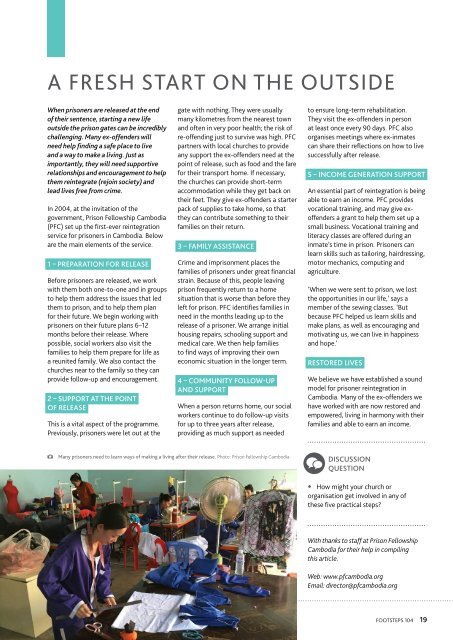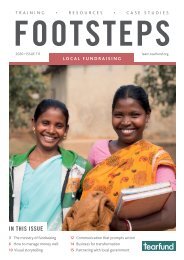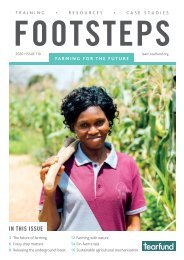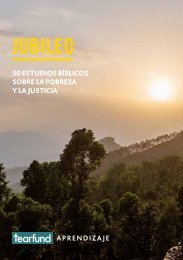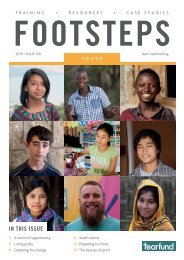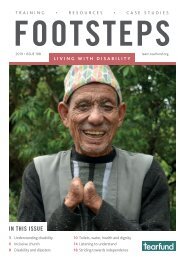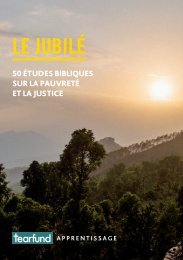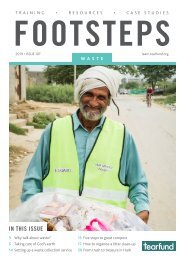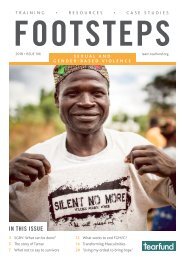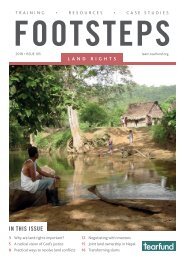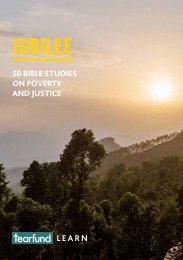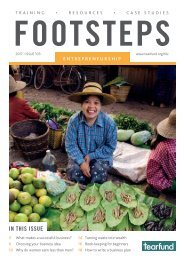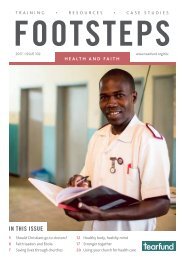Footsteps 104: Prisons
Footsteps 104 features practical tips for getting involved in prison ministry and caring for ex-offenders.
Footsteps 104 features practical tips for getting involved in prison ministry and caring for ex-offenders.
You also want an ePaper? Increase the reach of your titles
YUMPU automatically turns print PDFs into web optimized ePapers that Google loves.
A FRESH START ON THE OUTSIDE<br />
When prisoners are released at the end<br />
of their sentence, starting a new life<br />
outside the prison gates can be incredibly<br />
challenging. Many ex-offenders will<br />
need help finding a safe place to live<br />
and a way to make a living. Just as<br />
importantly, they will need supportive<br />
relationships and encouragement to help<br />
them reintegrate (rejoin society) and<br />
lead lives free from crime.<br />
In 2004, at the invitation of the<br />
government, Prison Fellowship Cambodia<br />
(PFC) set up the first-ever reintegration<br />
service for prisoners in Cambodia. Below<br />
are the main elements of the service.<br />
1 – PREPARATION FOR RELEASE<br />
Before prisoners are released, we work<br />
with them both one‐to‐one and in groups<br />
to help them address the issues that led<br />
them to prison, and to help them plan<br />
for their future. We begin working with<br />
prisoners on their future plans 6–12<br />
months before their release. Where<br />
possible, social workers also visit the<br />
families to help them prepare for life as<br />
a reunited family. We also contact the<br />
churches near to the family so they can<br />
provide follow-up and encouragement.<br />
2 – SUPPORT AT THE POINT<br />
OF RELEASE<br />
This is a vital aspect of the programme.<br />
Previously, prisoners were let out at the<br />
gate with nothing. They were usually<br />
many kilometres from the nearest town<br />
and often in very poor health; the risk of<br />
re‐offending just to survive was high. PFC<br />
partners with local churches to provide<br />
any support the ex-offenders need at the<br />
point of release, such as food and the fare<br />
for their transport home. If necessary,<br />
the churches can provide short-term<br />
accommodation while they get back on<br />
their feet. They give ex-offenders a starter<br />
pack of supplies to take home, so that<br />
they can contribute something to their<br />
families on their return.<br />
3 – FAMILY ASSISTANCE<br />
Crime and imprisonment places the<br />
families of prisoners under great financial<br />
strain. Because of this, people leaving<br />
prison frequently return to a home<br />
situation that is worse than before they<br />
left for prison. PFC identifies families in<br />
need in the months leading up to the<br />
release of a prisoner. We arrange initial<br />
housing repairs, schooling support and<br />
medical care. We then help families<br />
to find ways of improving their own<br />
economic situation in the longer term.<br />
4 – COMMUNITY FOLLOW-UP<br />
AND SUPPORT<br />
When a person returns home, our social<br />
workers continue to do follow-up visits<br />
for up to three years after release,<br />
providing as much support as needed<br />
to ensure long-term rehabilitation.<br />
They visit the ex-offenders in person<br />
at least once every 90 days. PFC also<br />
organises meetings where ex-inmates<br />
can share their reflections on how to live<br />
successfully after release.<br />
5 – INCOME GENERATION SUPPORT<br />
An essential part of reintegration is being<br />
able to earn an income. PFC provides<br />
vocational training, and may give exoffenders<br />
a grant to help them set up a<br />
small business. Vocational training and<br />
literacy classes are offered during an<br />
inmate’s time in prison. Prisoners can<br />
learn skills such as tailoring, hairdressing,<br />
motor mechanics, computing and<br />
agriculture.<br />
‘When we were sent to prison, we lost<br />
the opportunities in our life,’ says a<br />
member of the sewing classes. ‘But<br />
because PFC helped us learn skills and<br />
make plans, as well as encouraging and<br />
motivating us, we can live in happiness<br />
and hope.’<br />
RESTORED LIVES<br />
We believe we have established a sound<br />
model for prisoner reintegration in<br />
Cambodia. Many of the ex-offenders we<br />
have worked with are now restored and<br />
empowered, living in harmony with their<br />
families and able to earn an income.<br />
Many prisoners need to learn ways of making a living after their release. Photo: Prison Fellowship Cambodia<br />
DISCUSSION<br />
QUESTION<br />
••<br />
How might your church or<br />
organisation get involved in any of<br />
these five practical steps?<br />
With thanks to staff at Prison Fellowship<br />
Cambodia for their help in compiling<br />
this article.<br />
Web: www.pfcambodia.org<br />
Email: director@pfcambodia.org<br />
FOOTSTEPS <strong>104</strong><br />
19


